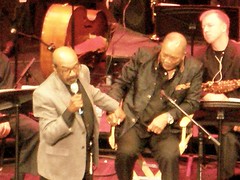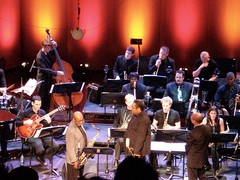“The music of Dizzy Gillespie spoke the language of freedom: the freedom to think; to innovate; and to speak in one’s own voice,” said U.S. Secretary of State Condoleezza Rice in video-recorded remarks to open the 50th anniversary commemoration of Dizzy Gillespie’s State Department-sponsored world tour at the University of Southern California’s Bovard Hall (watch video of Sec. Rice’s remarks here).
Special guests stars joined USC’s Thornton Jazz Band for a performance of Dizzy Gillespie classics as they were heard on the 1956 tour. On trumpet, Jon Faddis, who performed with Dizzy Gillespie since he was a teenager. His sound at USC was still powerful, lyrical, unpredictable and bright. Gillespie himself once said of his protege: “he’s the best ever, including me!”
Saxophonist James Moody performed in Dizzy Gillespie’s bands on and off since the 1940’s. His role in the 1956 world tour was indirect but significant, as Quincy Jones noted later in the night, when Jones called Moody up to thank him onstage.
‘Thanks, Brother’
 “I’ve wanted to say this for 50 years. If it wasn’t for this man – I wouldn’t be up here today,” Jones in thanking James Moody with an emotional embrace. “That man is the bomb!” Jones said of Moody, who recommended the young arranger and musician to be the 1956 band’s music director (which entailed, among other things, arranging and rehearsing a the national anthems of dozens of countries).
“I’ve wanted to say this for 50 years. If it wasn’t for this man – I wouldn’t be up here today,” Jones in thanking James Moody with an emotional embrace. “That man is the bomb!” Jones said of Moody, who recommended the young arranger and musician to be the 1956 band’s music director (which entailed, among other things, arranging and rehearsing a the national anthems of dozens of countries).
The dialogue quickly shifted from prose and praise to jazz as the USC Thornton Jazz Band struck up the opening bass line of “A Night in Tunisia.”  The capacity audience at Bovard Hall was treated to an hour-long sampling of the music performed on the 1956 world tour, including compositions by Quincy Jones and Benny Golson, all featuring virtuosic solos from Moody and the visually inspired Faddis, evoking Dizzy in both sound and physical appearance, save for the signature bent-skyward trumpet used by Gillespie in the 50s and 60s.
The capacity audience at Bovard Hall was treated to an hour-long sampling of the music performed on the 1956 world tour, including compositions by Quincy Jones and Benny Golson, all featuring virtuosic solos from Moody and the visually inspired Faddis, evoking Dizzy in both sound and physical appearance, save for the signature bent-skyward trumpet used by Gillespie in the 50s and 60s.
John Birks “Dizzy” Gillespie was already internationally famous 1956, primarily due to his exposure on Voice of America. In 1955, VOA launched it’s “Jazz Hour,” hosted by Willis Conover, which quickly grew into the stations most popular program, enjoyed by tens of millions of listeners in eighty countries, six nights a week.
As Quincy Jones explained, it didn’t take long for the band to realize the impact of their music.
Continue reading “50th Anniversary of Dizzy Gillespie’s State Dept-Sponsored World Tour”


